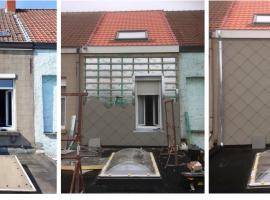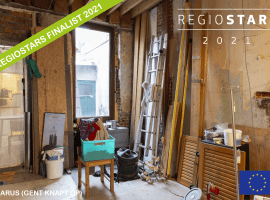The project successfully concluded in May 2022 with a series of exhibitions and presentations after renovating 82 houses for vulnerable families in Ghent. After three years of work in different neighbourhoods in the city of Ghent, 72 captive owners and 10 elderly captive owners participated in the final project countdown. The COVID-19 pandemic and associated restrictions presented challenges for a housing renovation project like Ghent Knapt Op, including difficulties in communication and supporting beneficiaries, engaging with the community, and material price increases and delivery delays. Although these types of challenges have been difficult to overcome, Ghent Knapt Op was adaptable and found creative solutions to continue making progress on the project by working with 82 households. Additional support was provided to beneficiaries and project staff who were facing health or financial challenges due to the pandemic.
































